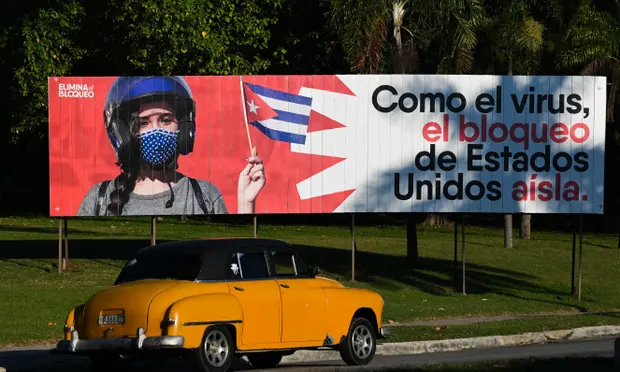
Em fevereiro de 1962 o presidente dos Estados Unidos, John F. Kennedy, decretou o embargo comercial contra Cuba. 60 anos depois a situação continua a mesma. Afinal, por que os Estados Unidos declararam embargo contra Cuba? Quais os resultados alcançados? Ainda faz sentido a manutenção de embargos contra Cuba?
A ideia de Kennedy ao declarar embargos comerciais contra Cuba era a de diminuir a ameaça que a ilha fazia aos Estados Unidos em função de seu alinhamento com o eixo comunista, lembrando que estávamos no auge da Guerra Fria. Seu objetivo era enfraquecer a economia cubana, o que poderia levar à uma revolta popular que questionasse o governo comunista levando a sua queda.
Como podemos ver atualmente, mesmo depois de 60 anos o objetivo de alterar o governo não ocorreu. Houve mudanças com o fim da ditadura Castro, mas o governo cubano continua sendo controlado pelo partido comunista.
Não há dúvida que a ameaça que Cuba poderia oferecer aos Estados Unidos diminuiu, mas não em função do embargo e sim da própria alteração do sistema internacional. A Guerra Fria acabou e a existência de alguns (poucos) países comunistas não apresenta uma ameaça ao sistema internacional como um todo ou aos Estados Unidos especificamente.
Muito da atual justificativa para a manutenção do embargo é que Cuba precisa virar uma democracia para, então, acabarem com os embargos. Passados 60 anos dessa política é possível perceber que não alcançará os resultados esperados. De um lado é uma explicação limitada na medida em que existem muitos outros países no mundo que não são democracias e que, mesmo assim, não têm embargos. Muito ao contrário, são importantes parceiros comerciais dos Estados Unidos, como é o caso da Arábia Saudita, importante fornecedor de petróleo para os Estados Unidos.
Ao mesmo tempo, a existência dos embargos acaba por oferecer uma razão para que o governo tenha uma razão em sua manutenção no formato como está. A existência de um inimigo que “explica” o motivo de Cuba estar com os problemas que está faz com que seja mais fácil a manutenção do governo ditatorial.
A conclusão é que embargos não são eficazes. Podem ser instrumentos para pressão momentânea, mas não têm qualquer garantia de sucesso e podem acabar gerando um resultado inverso ao que se pretende.
Considerando isso, proponho uma visão diferente para Cuba. Se o objetivo é mesmo mudar a natureza do governo cubando, instaurando uma democracia no país, os embargos devem ser extintos e o comércio estimulado. É fazer exatamente o oposto do que é feito atualmente.
Quanto maior for o comércio e as possibilidades econômicas, maior será a tendência de setores privados se beneficiarem e ganharem autonomia. Atualmente Cuba já tem ações desse tipo, não estamos mais falando de um Estado totalmente planificado. Quanto mais setores privados se engajarem em atividades econômicas, mais fortes estarão para promoverem outras visões de como o país deve ser conduzido. Isso levará ao fortalecimento da ideia de maior participação, do convívio de ideias diferentes, da canalização dos debates sobre as diferenças dentro de ambientes estatais (portanto, não violentos)… ou seja, estamos falando de uma democracia.
Pós-Doutor em Competitividade Territorial e Indústrias Criativas, pelo Dinâmia – Centro de Estudos da Mudança Socioeconómica, do Instituto Superior de Ciencias do Trabalho e da Empresa (ISCTE, Lisboa, Portugal). Doutor em Relações Internacionais pela Universidade de Brasília (2007). É Diretor Executivo do Mapa Mundi. ORCID https://orcid.org/0000-0003-1484-395X
